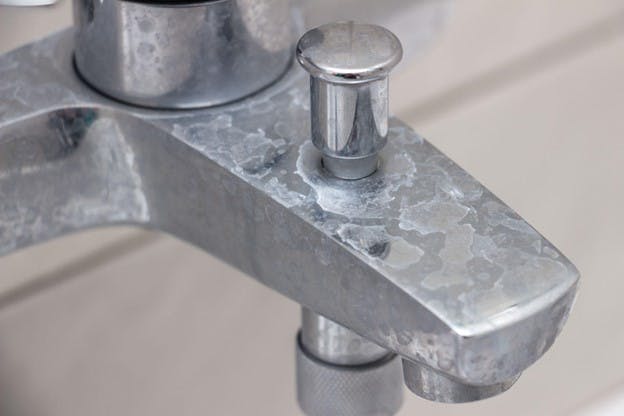August 2023
Does Boiling Water Get Rid of Chemicals, Metals, and Minerals?
Life is sensitive to the elements. If you make an environment too cold or too hot, it becomes impossible to survive in. Humans have used this to our advantage by cooking food at high temperatures and boiling water since before we knew microscopic life existed. And we still use it today when camping or when our water supply gets contaminated, causing a boil water advisory.
We know several minutes of a rolling boil will kill most bacteria and other living microorganisms but today there is a lot more that can be contaminating our water than pathogens. A large amount of harmful chemicals are used in factories, farms, mines, military bases, and even households. These chemicals often have nowhere to go, so they eventually end up in our water supply.
Some chemicals can be very dangerous, even in tiny amounts, and they aren’t living so they can’t be killed by heat. But does boiling water get rid of chemicals and other contaminants in some other way? And if not, what is the best way to get rid of chemicals in water?
In this article we’re going to look at a variety of chemicals and contaminants and figure out how effective boiling water is at removing them from your drinking water.
How Effective Is Boiling Water to Purify It?
There are roughly 160 million different chemicals known to humans. Each has different properties which make them more or less stable at different temperatures. Thermal decomposition is the temperature where the chemical bonds start to break down and the chemical changes.
Many chemicals also have a boiling point. This is a temperature where it will start to boil. You may know that the boiling point of water is 212 degrees Fahrenheit, or 100 degrees Celsius.
Boiling points are important because if a chemical has a lower boiling point than water, it is possible to boil the chemical out of your water before the water starts to boil.
This is actually how alcohol distillation works. Because alcohol has a lower boiling point than water, you can make alcohol in water boil, before the water will. This allows the alcohol to be separated cleanly from the water and other contaminants as steam as long as you can keep the temperature in the right zone.
Unfortunately, when we’re talking about purifying water, this won’t help us too much. Most of what we want to filter out of our water won’t break down or boil out at the temperatures water is boiled at. Let’s look at the more common chemicals and contaminants so we can better understand whether boiling is a viable option, and if not, see what is.
Does Boiling Water Remove Chlorine and Chloramines?
Yes. Boiling water will remove chlorine. However, you don’t really need to boil water to remove chlorine. Over time, it will evaporate on its own.
Chlorine and chloramines are common water disinfectants used by municipalities in order to kill pathogens and reduce waterborne illnesses. Chlorine is the main active ingredient in most bleach products. While it’s not dangerous in the amounts added during water treatment, many people choose to remove it due to its taste and smell.
The good news is that chlorine is fairly easy to remove with activated carbon or reverse osmosis water filtration. Even the very simple water filter pitchers will work and be easier and use less energy than boiling it.
Does Boiling Water Remove Fluoride?
No. Boiling water will not remove fluoride. In fact, it could raise the fluoride concentration in the water.
Fluoride is a naturally occurring mineral that is usually found in water supplies in small amounts. Many cities in the United States add even more as a public health initiative to improve dental health. Fluoride has been shown to strengthen tooth enamel and reduce instances of dental cavities when added to water.
If you want to remove fluoride from water, you’ll need to either distill the water or use a reverse osmosis system.
Does Boiling Tap Water Remove PFAS?
No. Boiling water does not remove PFAS from water.
Perfluoroalkyl and polyfluoroalkyl substances (PFAS) have been in the news a lot lately as more water sources are shown to be contaminated by them. We’re also learning much more about their dangers.
Known as “forever chemicals” since they don’t break down, PFAS have been used heavily for over 70 years in non-stick cookware, firefighting foam, waterproof makeup and other products. Does boiling water get rid of these chemicals? Unfortunately not. These were invented for cookware — they can withstand immense heat.
If you want to get rid of PFAS, multistage water filtration systems can reduce these impurities and increase your water quality. Look for NSF/ANSI 53 activated carbon filters or reverse osmosis filters.
Does Boiling Water Get Rid of Lead?
One of the most common impurities referred to when people ask “does boiling water get rid of chemicals?” is lead. Unfortunately, the answer is no. Boiling water does not get rid of lead.
Lead is a heavy metal and a neurotoxin that can be found naturally in the environment but was also very common in plumbing before 1986. Today, there’s a big effort to remove lead service lines and other pipes but it's been a slow process.
There is no safe level of lead in the blood of a child or a pregnant woman. Even small amounts can slow the nervous system and mental development. If you believe you have lead in your plumbing, you should contact your water supplier to get information on removing it.
In the meantime, point-of-use water filters are the best way of dealing with it. Point of use means the water is filtered right where you use it. Generally this would be an under sink filter connected directly to a faucet.
Most activated carbon filters will not remove lead, but there are exceptions. For instance, HomeWater’s EZCHANGE 2-Stage Under Sink Water Filter has two carbon filter cartridges. One is specialized for chlorine and the other for lead. It also removes rust, dirt, particulate matter, sediment, PFAS, and more.
Does Boiling Water Remove Hard Water Minerals?
In general, boiling water does not remove minerals or heavy metals from water. This includes hard water minerals like calcium and magnesium. If you’ve ever noticed the ring around your pot after you boil a bunch of water out, that’s the hard water minerals being left behind.
Hard water minerals are safe to drink but they can wreak havoc on your home. Not only can they corrode your pipes but the minerals stick to your surfaces, make your appliances work harder, and can even damage your skin.
The best way to get rid of hard water is by using a water softener. Water softeners use ion exchange technology to remove calcium and magnesium and replace them with a small amount of sodium or potassium.
The HomeWater All-In-One Whole Home Filter and Water Softener removes hard water minerals while reducing chlorine and sediment from every tap in your home.
Does Boiling Water Get Rid of Chemicals Like Atrazine?
No. Boiling water does not get rid of atrazine. This popular herbicide is used when growing many popular crops like corn and sugarcane. Unfortunately, it’s increasingly finding its way into our water systems.
In amounts greater than 3 parts per billion, it's considered unsafe. Atrazine is known to cause problems with the cardiovascular and reproductive systems. If you have atrazine-contaminated water, recommendations are to avoid using it for drinking, showering, or watering a vegetable garden.
To reduce atrazine from your water, use a granulated activated carbon filter and keep it well maintained.
Does Boiling Water Remove Arsenic?
A common question we get is does boiling water get rid of chemicals like arsenic? Like other minerals and metals, the answer is no. In fact, boiling water can increase the concentration of arsenic as the water boils out but the arsenic doesn’t.
Arsenic is naturally occurring in groundwater. Acute arsenic poisoning can be deadly. Exposure over time can lead to various types of cancer, skin lesions, cardiovascular disease, and diabetes.
If you need to remove arsenic from your water, use a reverse osmosis water filter. Do not try to boil it out.
Does Boiling Water Remove Nitrates?
No. Boiling water will not remove nitrates from your water. It will likely increase the concentration as you lose some water to evaporation but the nitrates will still be there.
Nitrates are naturally occurring in the environment but they are also used in some farming practices. Unfortunately nitrates can make it hard for our red blood cells to carry oxygen. This can be very dangerous in infants and some adults. It can even cause “blue baby syndrome,” which can be fatal.
If you have nitrates in your water, remove them with a reverse osmosis water purification system.
Is It Better to Boil or Filter Water?
It is usually better to filter water than boil it, although it depends on your circumstances and the type of filter available to you. For instance, if you find yourself in a boil water advisory, you should be boiling your water. Killing pathogens is likely the reason you’re being asked to boil your water. While some filters remove pathogens, many others do not.
If you’re receiving city water under normal circumstances, your water supplier will have already treated the water for microorganisms using a variety of methods like ultraviolet light and chemical disinfectants like chlorine. In that case, it's likely going to be chemicals, heavy metals, and minerals that will still be a concern.
While boiling water kills microorganisms like cryptosporidium and giardia, it does very little to remove chemicals, metals, and minerals. Boiling your water in this case would be a waste of your time and likely increase your energy bill.
The Best Way to Remove Chemicals From Water
Does boiling water get rid of chemicals at all? We have to remember that there are a lot of chemicals out there which can all act differently when boiled. However, over and over again, when looking at the chemicals most likely to be in our water, boiling is just not effective. In many cases, it can even make the problem worse.
If you’re concerned about water-contaminating chemicals, a better solution is likely a high-quality water filter. Our American-made HomeWater 4-Stage Reverse Osmosis Under Counter Water Filter features two activated carbon stages and reverse osmosis.
This point-of-use filter works to reduce sediment, chlorine, atrazine, total dissolved solids, arsenic, PFAS, barium, cadmium, hexavalent and trivalent, chromium, lead, copper, radium 226/228, selenium, fluoride, nitrate/nitrite, and more.
Not sure what filter is right for your situation? Take our quick Filter Quiz and get answers now!



